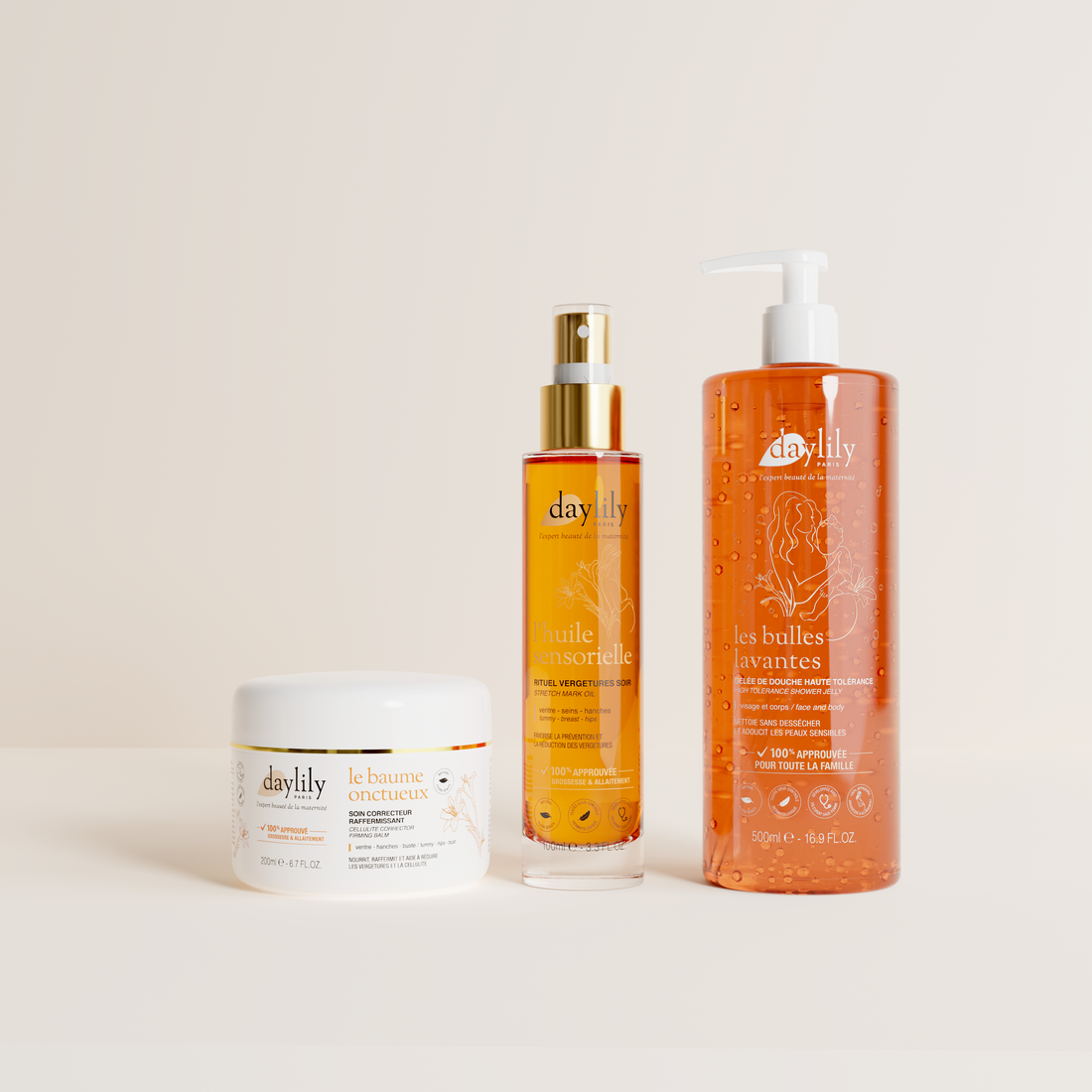- Cosmetic products and breastfeeding: caution!
- Why might essential oils be incompatible with breastfeeding?
- Which essential oils should you ban while breastfeeding?
- How to choose your care products while breastfeeding?
- Which creams are compatible with breastfeeding?
Cosmetic products and breastfeeding: caution!
Future mothers and breastfeeding women know this: adopting a healthy lifestyle, favoring a varied and balanced diet, eating organic are all actions that benefit baby ! For many, pregnancy and motherhood lead to a return to basics: we want basic care and simplicity !
It can then be tempting to turn to cosmetics with natural ingredients : shampoos, body cream, scrubs, etc.
Among the ingredients pointed out since the announcement of your pregnancy: essential oils ! Essential oils, often referred to by the abbreviation HE, have interesting properties: antiseptic, anti-wrinkle, soothing, etc. As such, they are very often included in cosmetics (facial, hair, body care, etc.), particularly in organic care which favors ingredients from nature.
You may have heard that pregnant and breastfeeding women should ban them completely or only use them on medical advice. Without demonizing them, it is indeed necessary to handle them with caution, because essential oils used by the mother can reach the baby's body through breast milk .
It is not always easy to spot the presence of essential oils in the INCI list (the famous list of ingredients which appears on the packaging): it is often not very readable, and full of barbaric names which do not evoke you. nothing ;-) In addition, essential oils can be hidden in the perfume of cosmetics , simply under the heading “Perfume” or “Fragrance”. And the concentration of essential oils never appears. Faced with this opacity , it is better to turn to treatments that clearly indicate “without essential oils” to avoid unpleasant surprises!
Why might essential oils be incompatible with breastfeeding?
To answer this question, let's first review the basics and definition of an essential oil.
Lavender essential oil, for example, is obtained by distilling the famous purple flowers while iris essential oil comes from the roots of the plant.
Beyond their external use (in a beauty product for example), essential oils can also be absorbed orally or respiratoryally.
The EOs are very concentrated , and very powerful. The active ingredients of an essential oil applied to the skin will very quickly pass through it to reach the blood circulation, then the target organs . Essential oil is considered to pass the skin barrier when it is present at 3% in a cosmetic product. The principle is the same for inhalations: the essential oil passes quickly into the bloodstream through the lungs.
Essential oils being very concentrated, babies, due to their small weight and digestive, nervous and respiratory immaturity, are particularly vulnerable to their absorption. Risk of allergies, convulsions, toxicity... caution is advised in children under 3 years old, and even beyond for certain essential oils. It is important to always seek medical advice, respect the dosage indicated by your healthcare professional, and use the purest oils (organic if possible, whose origin is clearly indicated and certified) before using essential oils for you or for your children.
Which essential oils should you ban while breastfeeding?
All essential oils should not be put in the same bag, and while some can be used on medical advice, others should absolutely be avoided.
Each essential oil contains active molecules : such as ketones, phenols, terpenes... To get into the technical aspect of things, we consider that essential oils containing ketones, aldehydes or phenols should not be used during pregnancy and breastfeeding.
Among the essential oils to absolutely ban for future and young mothers, we can cite for example: medicinal sage, peppermint, globular eucalyptus, mentholated eucalyptus and rosemary CT camphor, but also camphor basil, cinnamon, clove, helichrysum, aniseed ravensare, thuja…
This list is not exhaustive.
Note that jasmine essential oil does not contain any of the molecules considered dangerous, but should not be used because it slows down the flow of milk.
What you need to remember is that certain essential oils can be used on medical advice while respecting the dosage and method of administration. During breastfeeding, no essential oil should be applied directly to the chest, and self-medication is prohibited!

How to choose your care products while breastfeeding?
We grant you, it is difficult to find your way around ! Indeed, essential oils are not the only ones to be singled out by the media and health professionals, and certain other ingredients – widely used in cosmetics – can be just as harmful to a breastfed baby.
Let us cite for example, endocrine disruptors (which include parabens, triclosan, phthalates, glycol ethers, etc.) which can trigger premature puberty. Certain sunscreens (in particular those marked “nano”, which indicates the presence of nano-particles), pass into the organs, and are responsible, according to scientists, for cardiovascular diseases and cancers. Thiazolinones and many perfumes (whether natural or synthetic) are allergens. And the list of harmful (or supposedly harmful) ingredients is long, unfortunately! The lack of transparency of many brands, or their tendency to highlight the “good” ingredients while hiding the bad ones, makes things complicated when choosing your beauty products.
To avoid taking the slightest risk, the best thing is to rethink your beauty routine and turn to treatments “specially formulated for pregnant women from the first month and breastfeeding women”. This notice appears clearly on all face and body creams intended for young and future mothers. You will be able to use them safely , without asking yourself any questions!
At Daylily, it's simple: we have identified the ingredients not recommended for a pregnant or breastfeeding woman : allergens, irritants, toxicants, endocrine disruptors... and to avoid taking the slightest risk, we have simply banned them! This is why our face and body treatments meet a strict formulation : you will not find any harmful ingredients (or supposed to be harmful) for you or for your baby. We have deciphered the list of ingredients used in our formulations on our site: so you know exactly what you are applying to your skin.
Which creams are compatible with breastfeeding?
Face cream or body cream, there's no question of not pampering your skin if you've decided to breastfeed your baby! Daylily treatments are compatible with breastfeeding and will help you keep or regain beautiful skin after childbirth, with complete peace of mind.
During breastfeeding, two treatments are particularly suitable for young mothers: the Creamy Balm for the body, and the Radiant Cream for the face.
Breastfeeding women, like pregnant women, are particularly exposed to the appearance of pregnancy mask . In fact, the hormones, which already made your skin more sensitive to the sun and UVA-UVB during your pregnancy, are still doing their thing! The pregnancy mask can appear during breastfeeding, or intensify if it has already appeared during these nine months. Remember to moisturize your pretty face and protect it from the sun in a single gesture with our cream for pregnant and breastfeeding women, La Crème Radieuse and its SPF50+: no white or sticky effect, no questionable ingredients: it will be your ally during and after pregnancy to intensely hydrate your skin and protect it from UV rays in a single step !
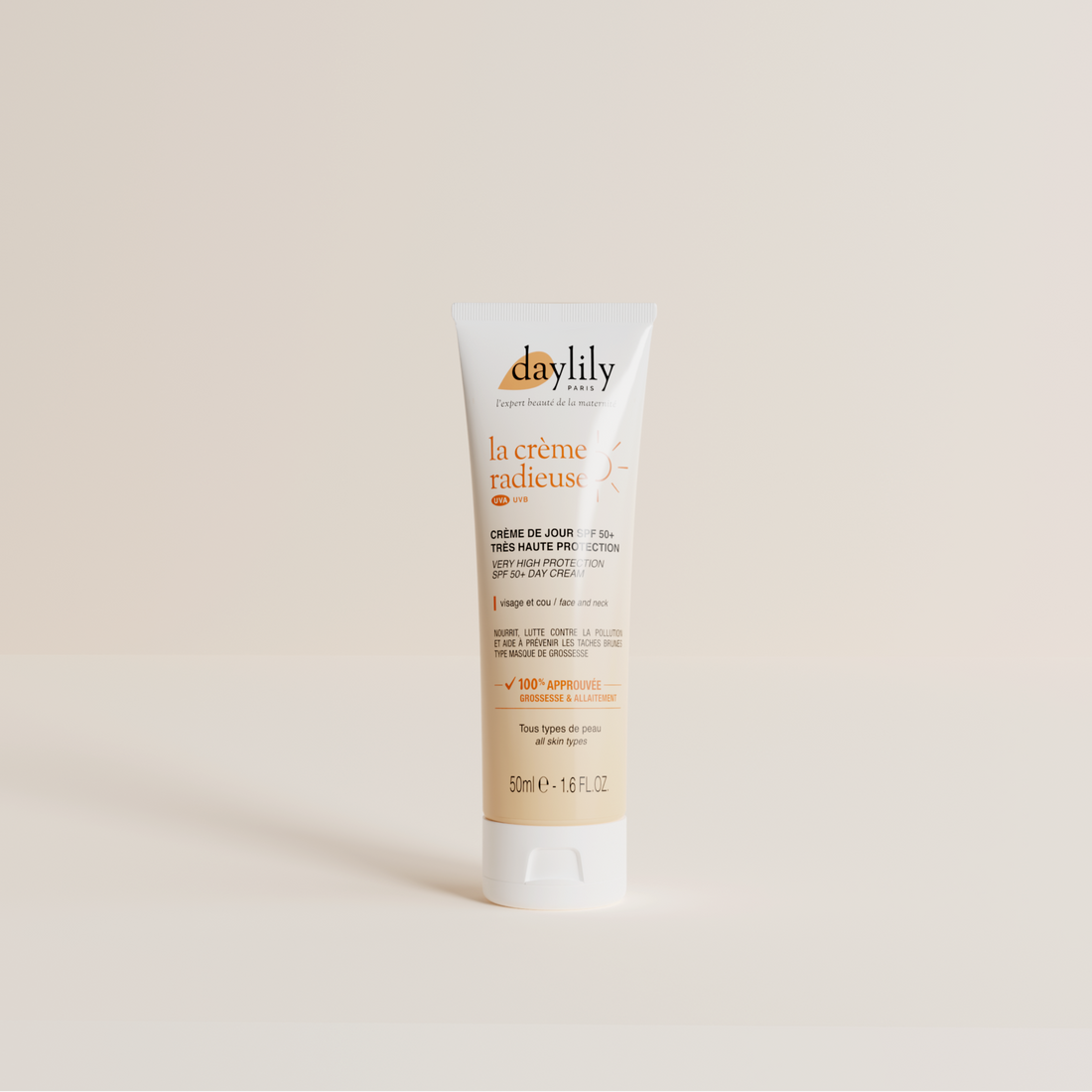
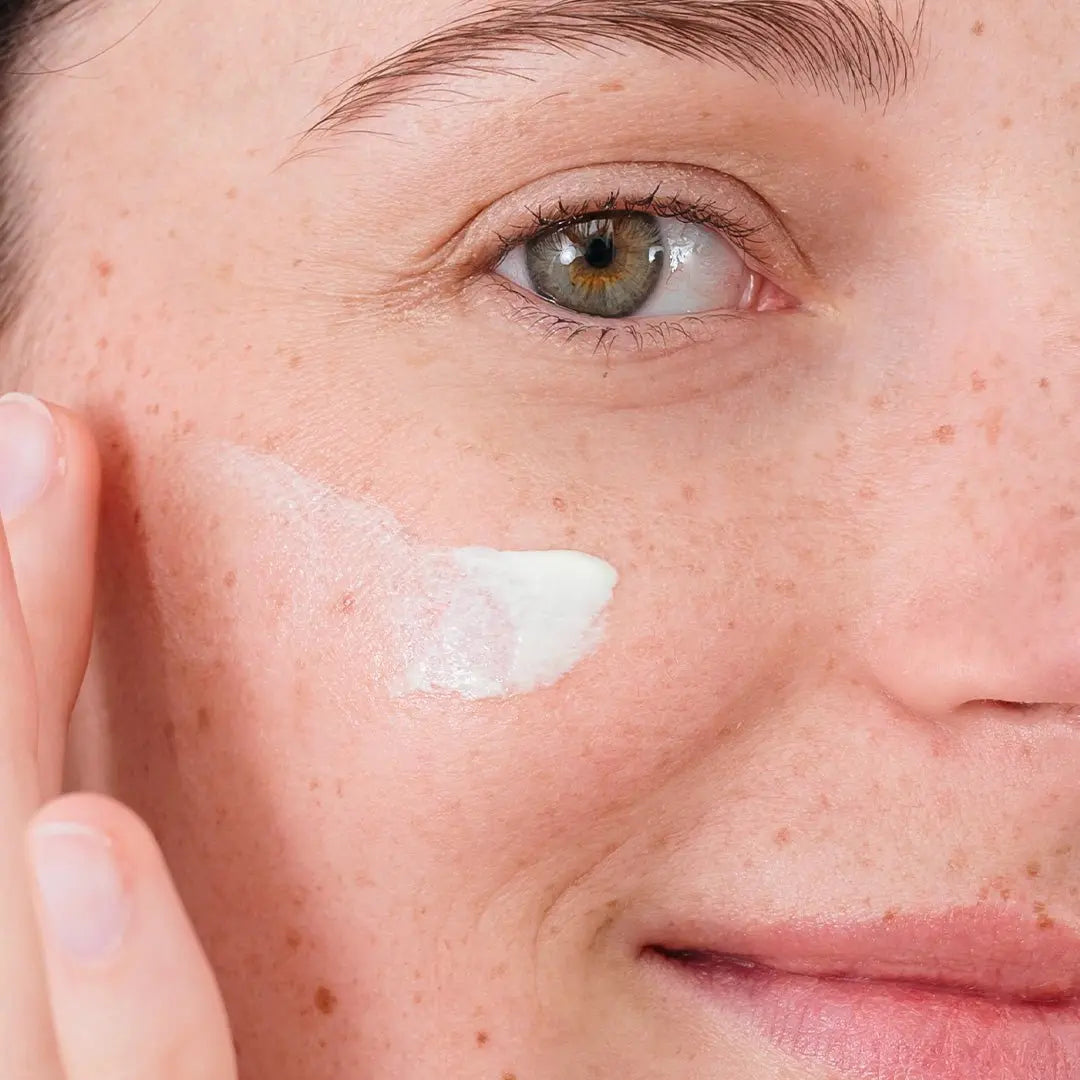
- Regular price
-
24,90 € - Regular price
-
- Sale price
-
24,90 €
The Baume Onctueux was designed for women who want to take care of themselves before or after childbirth and find their body at its best with natural cosmetics, whose safety is proven. In fact, many “slimming” creams contain ingredients not recommended during breastfeeding, such as caffeine. Because we know that with a baby at home, your days are very busy, the Creamy Balm offers you a 3-in-1 action in a single gesture: firming, anti-cellulite, and anti-stretch marks. It contains a particularly effective natural active ingredient, Body3Complex (composed of bentonite, avocado kernel extract and shea butter) which will:
- Stimulate the breakdown of lipids, and thus help you eliminate orange peel skin, which often invades the thighs, buttocks and hips of pregnant women.
- Firming your distended skin after childbirth
- Improve the appearance of stretch marks already present, by reducing their length, their number, and attenuating their color, while preventing the appearance of new streaks!
And of course, its complex of vegetable oils (avocado, olive, macadamia, rosehip and sweet almond oil) completes the formulation to intensely nourish your epidermis and regenerate it.
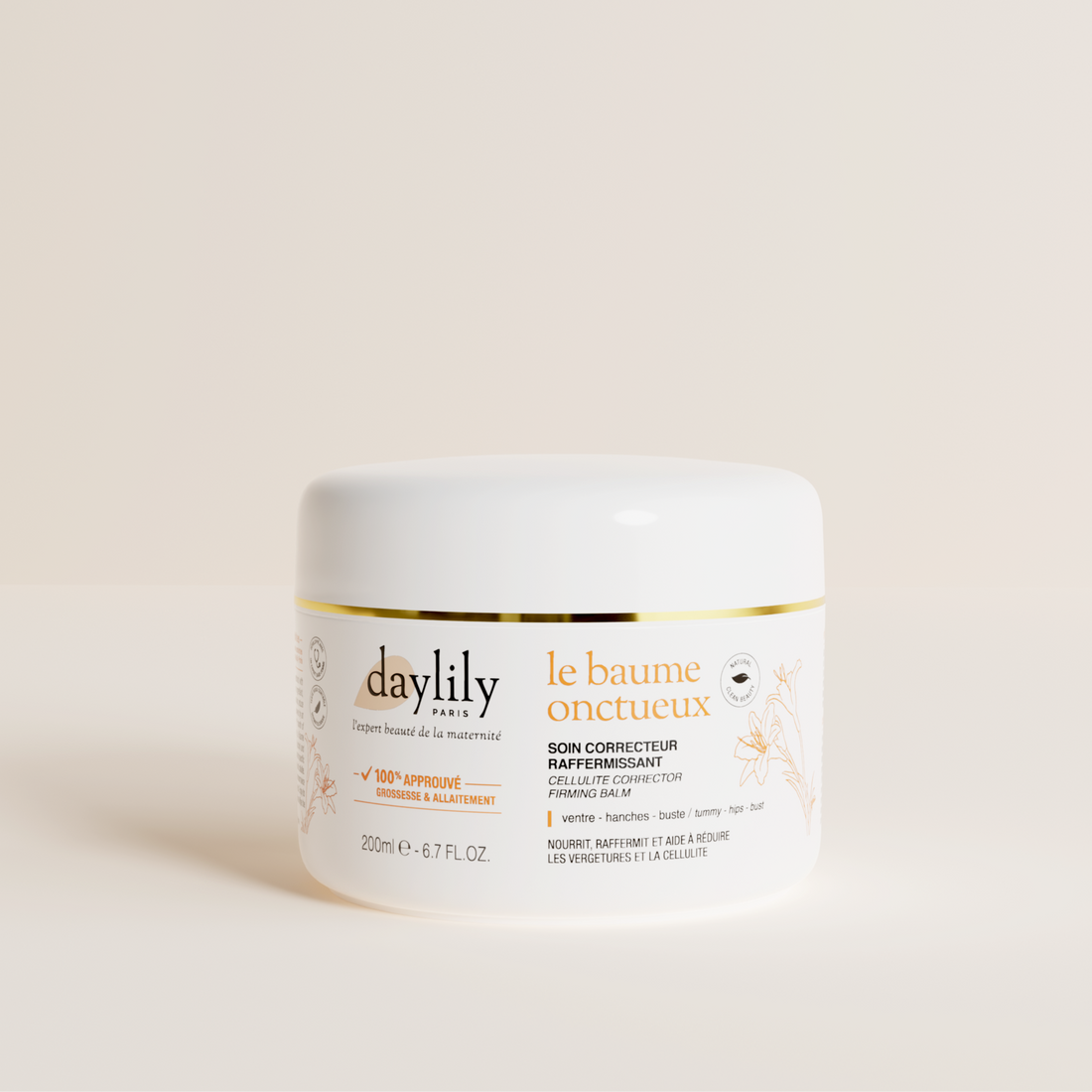
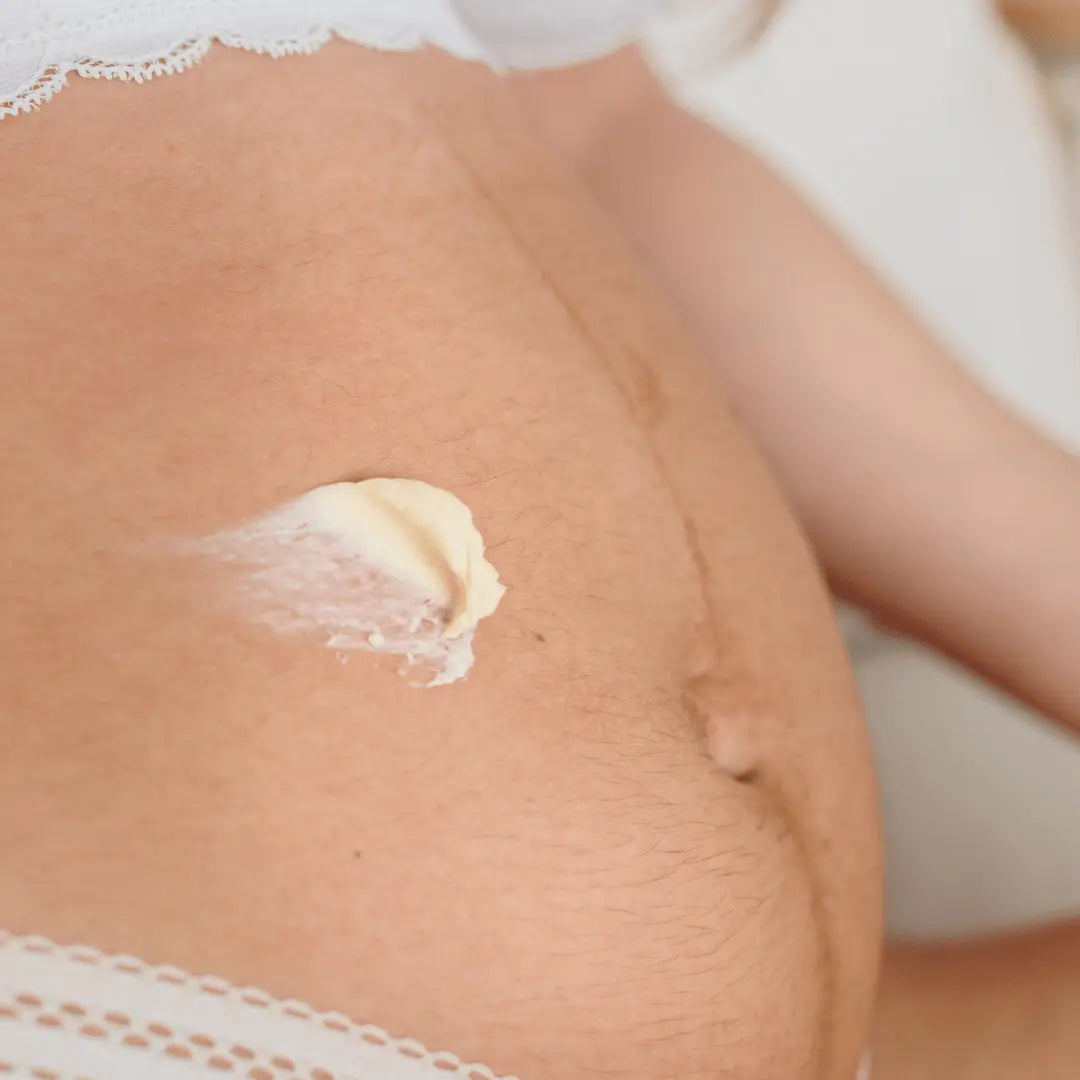
- Regular price
-
35,90 € - Regular price
-
- Sale price
-
35,90 €
If you are looking for solutions to fade the red stretch marks that appeared during your pregnancy and continue to prevent their appearance, consider our Huile Sensorielle and our Anti-Stretch Mark Lait Fondant : two gourmet treatments designed to reduce the size and improve the appearance of those purple streaks before and after childbirth.
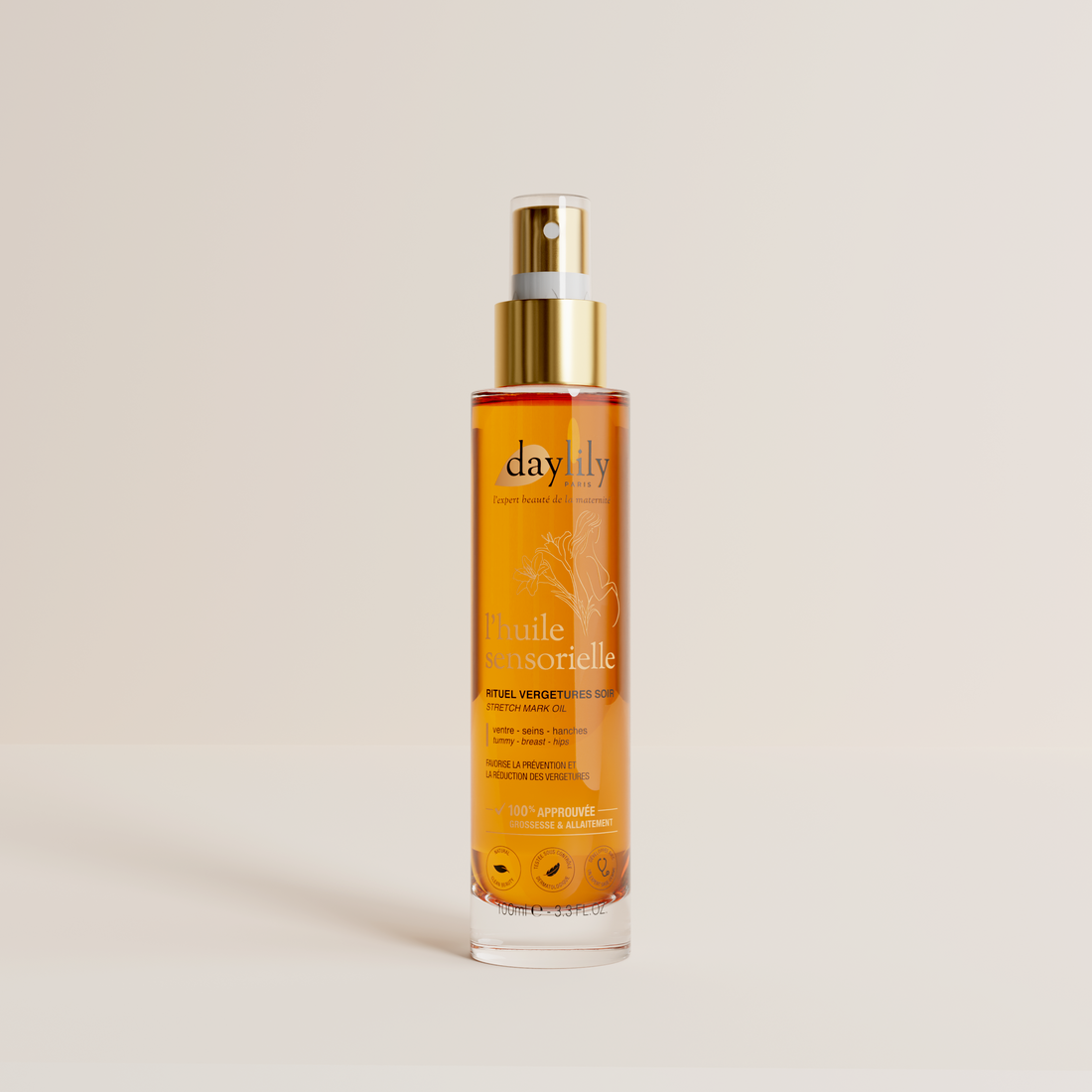
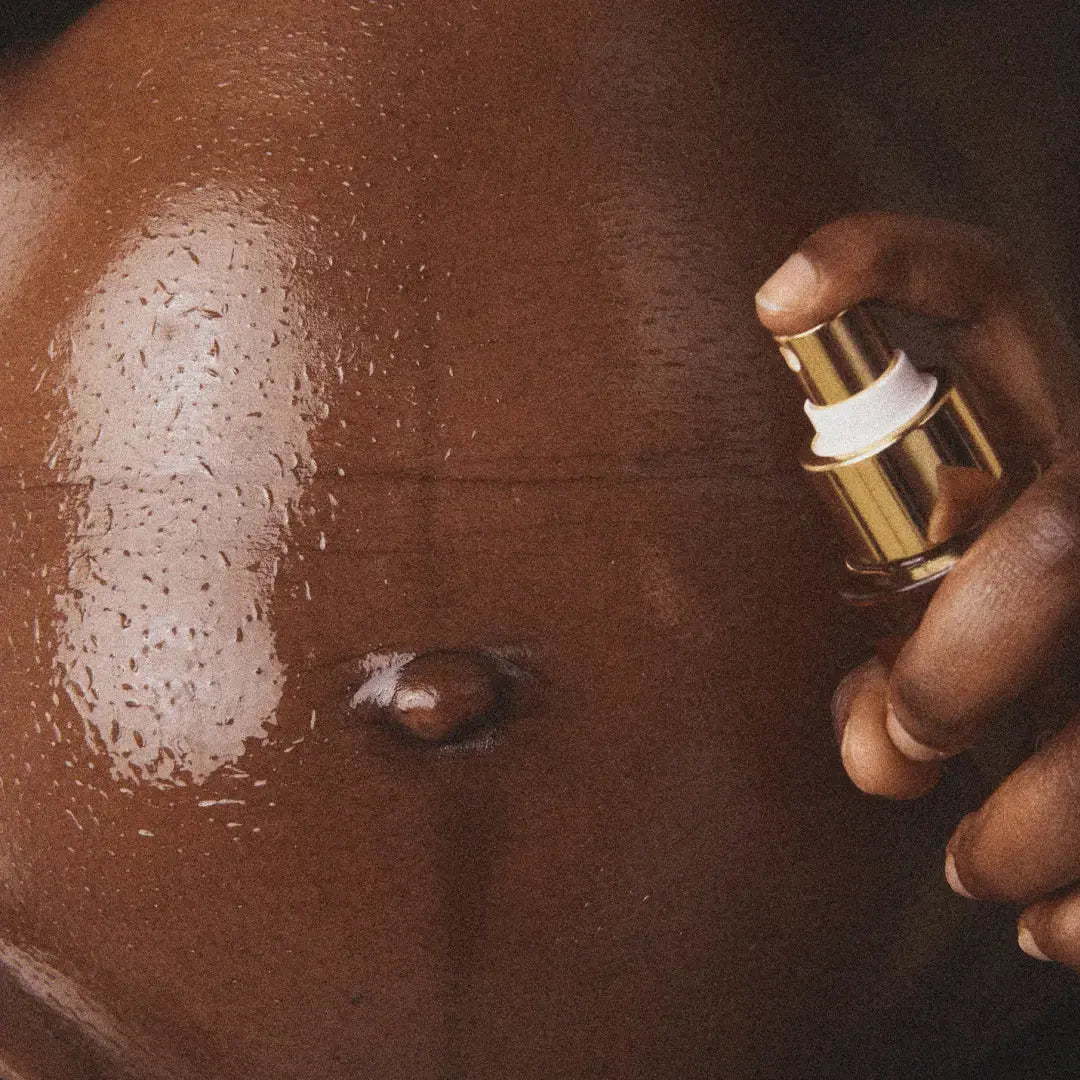
- Regular price
-
30,90 € - Regular price
-
- Sale price
-
30,90 €
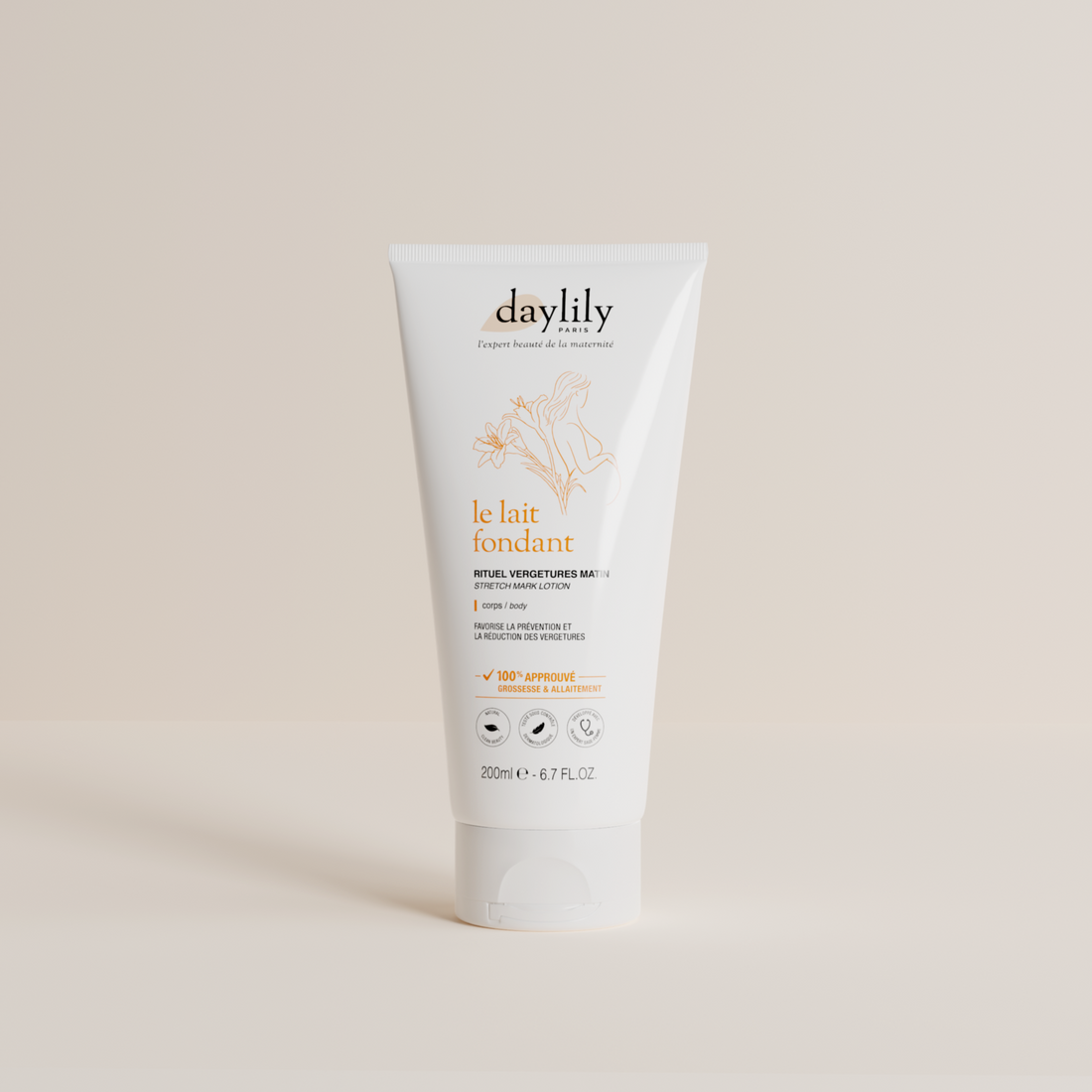
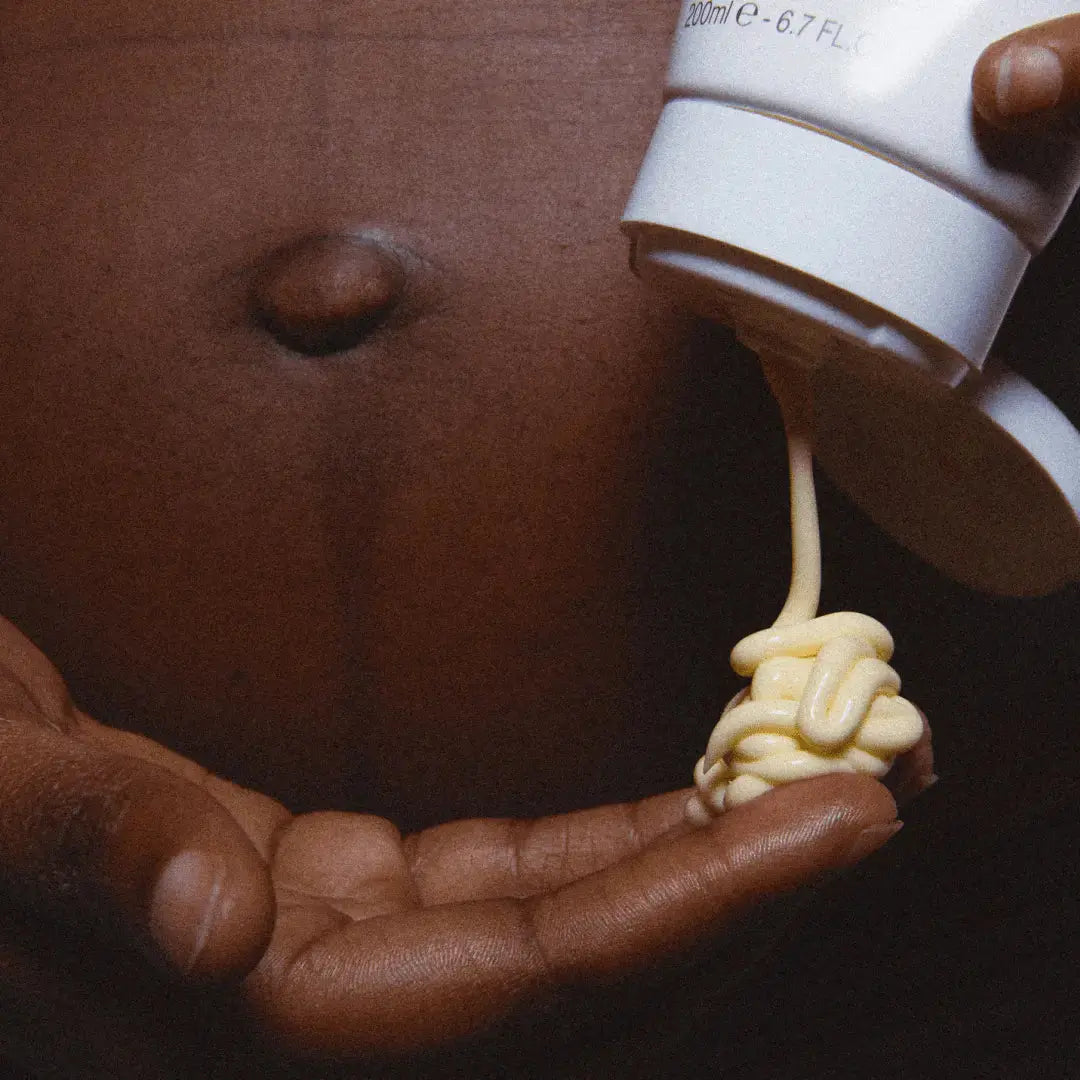
- Regular price
-
29,90 € - Regular price
-
- Sale price
-
29,90 €
As you can see, choosing what you apply to your skin when breastfeeding is not an easy task, and it is preferable to adopt treatments that clearly state their compatibility with breastfeeding . Essential oils, for example, should be used with caution and on medical advice. If in doubt, do not hesitate to ask your pharmacist, doctor or midwife for advice: there is no question of taking the slightest risk !
For your post-partum facial and body beauty routine, choose treatments without essential oils and harmful ingredients, which will not have an impact on baby's health, and which will help you pamper your skin even during the period of birth. feeding with milk.








